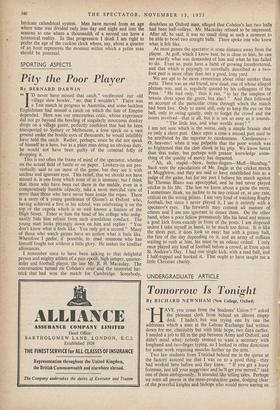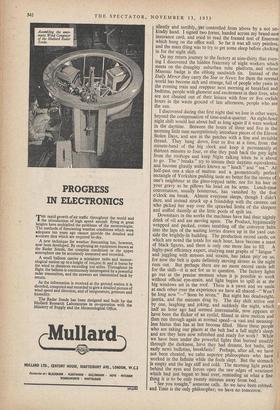UNDERGRADUATE ARTICLE
Tomorrow Is Tonight
By RICHARD NEWNHAM (New College, Oxford) 46 AVE you come from the Students' Union ? " asked the pleasant clerk from behind an almost empty desk. I hadn't, but was trying one by one the addresses which a man at the Labour Exchange had written down for me, charitably but with little hope, two days earlier. I needed a job to fill in the gap between Army and Oxford, and didn't mind what; nobody seemed to want a secretary with longhand and two-finger typing, so I looked in other directions for some work requiring muscles farther up the arm. Two law students from Trinidad behind me in the queue at the factory assured me that I was on to a good thing—they had worked here before and they knew. "If you get a lousy foreman, just tell your supervisor and he'll get you moved," said one of them ambiguously. It sounded like telling tales. Perhaps we were all pawns in the mass-production game, dodging clear of the powerful knights and bishops who would move among us silently and terribly, yet controlled from above by a not un- kindly hand. I signed two forms, handed across my brand-new insurance card, and tried to read the framed text of Emerson which hung on the office wall. So far it was all very painless, and the main thing was to try to get some sleep before clocking in for the night shift.
On my return journey to the factory at nine-thirty that even- ing I discovered the hidden fraternity of night workers which meets on the draughty suburban tube platform, and whose Masonic badge is the oblong sandwich tin. Instead of the Daily Mirror they carry the Star or News; for them the normal world has become rich and strange, full of people who yawn in the evening train and reappear next morning at breakfast and bedtime, people with glamour and excitement in their lives, who are not cheated out of their leisure with four or five owlish hours in the waste ground of late afternoon, people who see the sun.
I discovered during that first night that we lose in other ways, beyond the compensation of time-and-a-quarter. An eight-hour night shift would last about half as long again if it were worked in the daytime. Between the hours of three and five in the morning little men surreptitiously introduce pieces of the Eleven • Stolen Days, and sew in the patches with a fine and invisible thread. They hang down, four or five at a time, from the minute-hand of the big clock and keep it permanently at thirteen minutes to four, or else they push back the grey light • from the rooftops and keep Night talking when he is about to go. The " breaks " try to imitate their daytime equivalents, and become ghastly wakes known as " lunch " and "tea." At half-past one a slice of mutton and a geometrically perfect rectangle of Yorkshire pudding taste no better for the snores of one's neighbour at the glass-topped table, nor for his hair in your gravy as he pillows his head on his arms. Lunch-time conversation, usually boisterous, has vanished by the five o'clock tea break. Almost everyone sleeps, though I didn't dare, and instead struck up a friendship with the canteen cat who picked her yvay over the sprawled limbs of the sleepers and sniffed daintily at the little pools of spilt tea. Downstairs in the works the machines have had their nightly drink of oil and are moving again. The Product, hygienically wrapped and packed, comes tumbling off the conveyor belts into the laps of the waiting lorries drawn up in the yard out- side the brightly-lit building. The production record cards, on which are noted the totals for each hour, have become a mass of black figures, and there is only one more line to fill. A highy-paid efficiency expert, studying neat graphs of " fatigue " and juggling with stresses and strains, has taken pity on us, for now the belt is quite definitely moving slower as the night runs out. But perhaps there are no more record cards left for the shift—it is not for us to question. The factory lights go out, at the precise moment when it is possible to work without official eye-strain, and light begins to spill in at the big windows set in the roof. There is a yawn and we smile at each other over the experience we have all shared—" Won't be long now "—" Soon be seven." But night has deadweight, ' inertia, and the minutes drag by. The day shift arrive one by one, laughing and joking, and suddenly the night, which half an hour ago had seemed interminable, now . appears to have been the flicker of an eyelid, filmed in slow motion and then run through again at normal speed—a vast and meaning- less hiatus that has at last become filled. Have these people who are taking our places at the belt had a full night's sleep, and are they here now refreshed and ready for work? While we have been under the powerful lights that burned steadily through the darkness, have they had dreams, hot baths, the early news bulletins, breakfasts? Perhaps, after all, we have not been cheated, we calm superior philosophers who have worked in the Infinite while the fools slept. But the stomach Is empty and the legs stiff and cold. The morning light pricks behind the eyes and forces open the raw edges of weariness which had just begun to heal over, reminding us what a fine thing it is to be only twenty minutes away from bed. "See you tonight," someone calls. So we have been robbed, and Time is the only philosopher; we have no tomorrow.

































 Previous page
Previous page